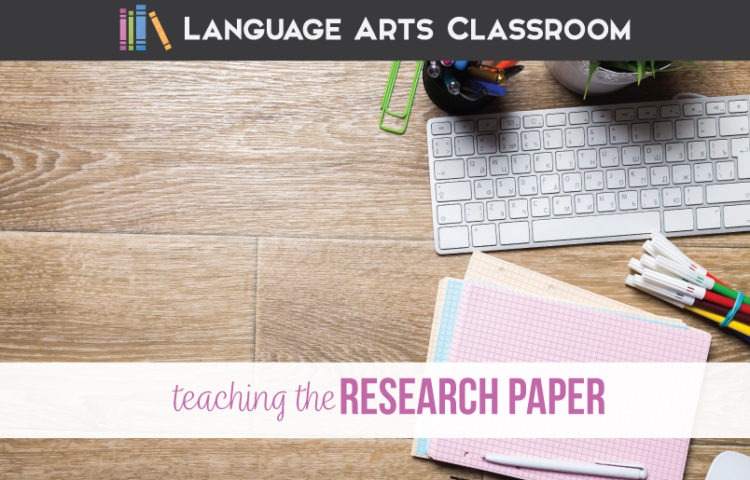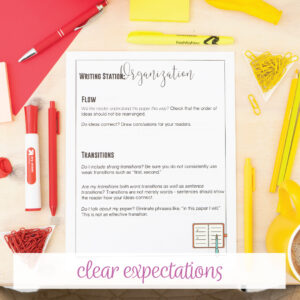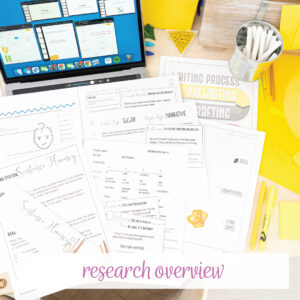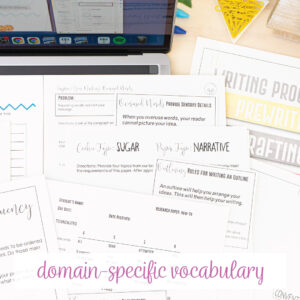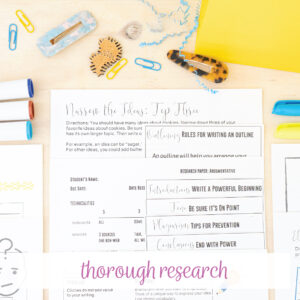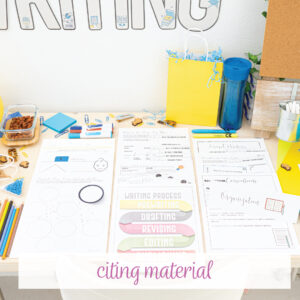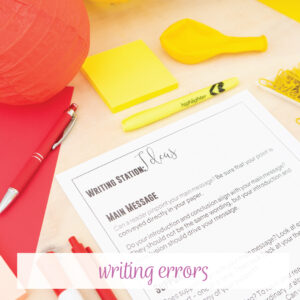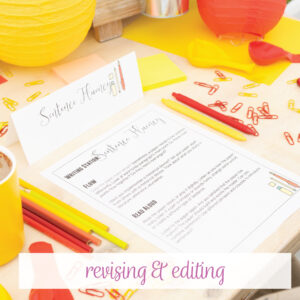Teaching research papers with high school students? Teaching students how to write a research paper is an important part of an ELA class. Here are guidelines to make this writing unit a success.
Teaching research papers provides ample opportunities for teachers to provide a strong foundation for future work, to encourage literacy. As a professional, I research ideas and implement best practices daily. Most professionals create mini-research papers for their careers. As a teacher, I often research methods to help struggling students or the best way to present a concept. That research and my commentary ends up in my lesson plans, in front of administrators or parents, and sometimes in student files.
Lawyers, political organizers, advertisers, real estate agents: most jobs require ethical research and then a written report. As a citizen, I research concepts important to my community and family. As knowledge in our world grows, student will only have more reasons to be ethical digital citizens.
Providing students with a sustainable foundation is a humbling responsibility. Teachers know that teaching students how to write a research paper is important. While teaching students how to research, I share those sentiments with them. I want students to know I take research seriously, and my expectation is that they will as well. My research paper lesson plans take into account the seriousness of ethical research.
What is the best way to teach research papers to students?
The best way to teach research papers to students is by breaking down the process into manageable steps. Start with teaching them how to choose a topic, conduct research, and create an outline/list/graphic organizer. Then guide them in writing drafts, revising and editing their papers, and properly citing sources.
Even after teaching for a decade, I sometimes overwhelm myself with this duty. I handle teaching research papers with four ideas in my mind.
Provide clear expectations.
Idea one, be clear.
A feeling I always hated as a student was the unknown. Sure, part of the learning process is not knowing everything and making mistakes. I, as the teacher, don’t want to be the source of frustration though. I never want my classes to wander down a path that won’t advance them toward our end goal: a well-researched paper. Part of teaching research skills to high school students is providing clear expectations.
As writing in the ELA classroom becomes more digital, I simply give writers tools on our online learning platform. That way, I can remind them to check a certain section or page as we collaborate on their writing.
Give a writing overview.
Idea two, provide an overview.
Every teacher grades a little differently. Sometimes, terminology differs. Throw in the stress of research, and you might have a classroom of overwhelmed students. An overview before teaching research papers can relax everyone!
I start every writing unit with clear expectations, terminology, and goals. I cover a presentation with students, and then I upload it to Google Classroom. Students know to consult that presentation for clarity. Initially, covering the basics may seem wasteful, but it saves all of us time because students know my expectations.
Furthermore, parents and tutors appreciate my sharing that information. As students work independently (inside or outside of class), they can take it upon themselves to consult expectations. Their responsibility with this prepares them for their futures. Finally, having established that overview with students during virtual classes was invaluable.
Show an overview of research.
Idea three, clearly explain research.
Before you begin teaching students how to research, outline what strong research looks like. You might consider these questions:
- What (if any) secondary sources will I accept? What about Wikipedia?
- Should students use a balance of books and online material? Do they have access to books?
- Are dates for certain topics important? Will I not accept research from before a certain date?
I’m not answering these questions for you, but I’ve seen teachers provide such guidelines while teaching research skills to high school students. Whatever parameters you have for teaching the research paper, share those with students.
Define domain-specific vocabulary.
Idea four, don’t assume classes share the same domain-specific vocabulary.
High school classes are likely familiar with the writing process, yet the research process brings more vocabulary with which they might not be familiar.
Providing definitions for the most basic concepts enables me to walk through expectations and clarify concepts. Examples might include:
- Informational text
- Search engine
- Credible sources
- Claim, counterclaim
- Research question
- Journal articles
Plus, by providing definitions to terms, scaffolding occurs naturally. Academic writing has terms we teachers might use casually, but some students maybe have not heard of them.

How can we model ethical research?
After outlining expectations to young writers, we begin research. Some schools rely on Google Scholar, and others use Explora or EBSCO. Sign students into your databases, and run them through the program.
I stress to young writers that conducting oneself with honesty and integrity is crucial to writing. When teaching research papers with high school students, I connect these ethics to their very near futures. Aside from the basics of documenting and citing, I highlight these two points.
- Thorough research. Accurate research means verifying the information from more than one source. This especially proves true when researching controversial or unclear timelines or materials. For example, I once had a student research a baseball player. The player’s birthdate was unclear. Many sources reported that the birthday provided to the States was a lie; other sources claimed that he was indeed that successful at a young age. The rub was that the student was a huge fan of this player and wanted to discard all research of the debate and present this player as a young miracle. The entire paper’s theme (that this baseball player achieved success at a young age) had questionable research, which is not thorough research. Fair and accurate research means not cherry-picking.

- Citing material. This includes direct quotes and paraphrasing. I review both of those concepts throughout our research and writing. The majority of a paper should be the writer’s thoughts, supported by research. Students need those concepts repeated, and they are important, so I spend time emphasizing them.
Often, I turn the basics of research into a writing mini lesson. Modeling ethical research is a very specific part of ELA classes. I understand that other classes require research and that parents might teach research skills as well.
Still, to have a functioning society, students must view relevant information with critical eyes. Teaching young citizens how to write a research paper includes clear guidelines for research and one-on-one conferencing.
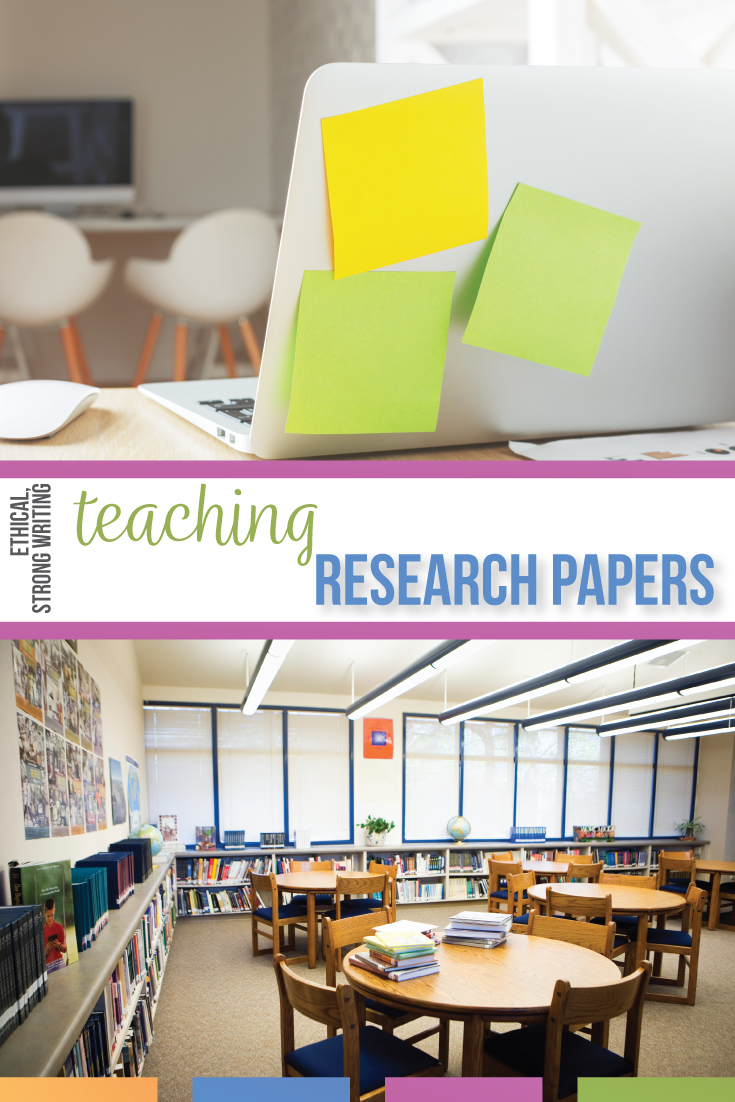
How can we encourage strong writing?
Hopefully, students write with passion. Hopefully, they want to show or prove their statements. Teaching students how to write a research paper is easier when students enjoy their topics.
I cover grammar with students (all year), and I always make the connection for them to implement those lessons. Teaching them to write a research paper requires some focus on writing skills. Primarily, they will work on strong verbs and syntax.
Look at verbs.
Students possess strong verbs in their vocabularies. Sometimes in writing, humans create a fast rough draft, myself included. Every verb is a linking verb, and every sentence reads subject + linking verb + predicate adjective. (Nothing is wrong with a linking verb, but writers should break from the mold.) When I see that a paper can be improved with strong verbs, we conference about ways to improve the verbs without thesaurus abuse.
Ask students to pick their least favorite paragraph in a research paper and to highlight every verb. Chances are, they are not conveying their message because of weak verbs. Help them turn the predicate adjectives into verbs or think of an action that will convey their meaning. Additionally as you continue teaching students how to research, you’ll cross strong verbs in research. Point out those verbs to your classes.
Examine syntax.
Just as every sentence shouldn’t contain a linking verb, not every sentence should be a simple sentence. Sentence syntax takes practice, and often teamwork! Ask students to provide a sentence that needs improvement. Break the sentence down into phrases and clauses. (If it is a simple sentence, ask for another sentence to attach.) What is the best arrangement? What is the student’s goal? Would a conjunctive adverb lead readers to a conclusion? What if a subordinating conjunction started the sentence, or, should the dependent clause come second in the complex sentence? Play with the language of papers! By connecting grammar to writing, you have empowered learners to improve their writing.
Sentence structure is also part of teaching students how to write a research paper because the information must be factual. Sometimes students report information incorrectly, and sometimes, their sentence structure is to blame. Focus on a return to simple syntax for ethical research, and then work on sentence diversity if possible.
All parts of an ELA classroom fit together like puzzle pieces, and when teaching research papers, that neatly assembled puzzle sits on display. By giving classes clear expectations, you are ready to guide them through ethical research and through strengthening their writing. Teaching the research paper is a large task, so you should know what you want to accomplish.
Is scaffolding teaching research papers possible?
Overall, a research unit takes me 2-3 weeks with high school students. Every teacher has different methodologies, but if I allow writing research papers for about a month, writers become bored. Fifteen working days for research, revision, and publishing is my average time frame. Going longer, and different aspects fall apart, and we lose momentum.
Scaffolding is built into our days. Outline the writing process with your calendar, and add days that follow the writing process. Pieces to consider:
Scaffold writing errors.
Overall, writing errors are an inevitable part of the learning process. As teachers, it is crucial that we address these errors in a way that not only corrects them but also helps students understand why they occurred in the first place. When it comes to research papers, grammatical errors can significantly affect the credibility and clarity of the information presented.
One effective way to scaffold writing errors is by focusing on the actual problems that classes have in their papers. When we conference, I jot down common errors and then cover them as a class.
Include revising and editing days.
Young writers should take ownership of the writing process which includes revising and editing. This can be achieved by dedicating specific days in the research unit for revising and editing. By allotting time for these crucial steps, writers will learn to critically analyze their work and make necessary improvements.
During the revision phase, students can focus on the overall structure and organization of their research paper. They should evaluate if their arguments are clear and logical, if the evidence supports their claims effectively, and if there is a smooth flow of ideas throughout the paper. This stage allows them to refine their content and ensure that it aligns with their desired objectives.
After revising, students should move toward publishing and sharing with their peers.
Your turn, writing teachers: What questions do you have left?
All activities mentioned in this post (except the common errors bundle) are included in my writing bundle for freshmen and sophomores.
What questions remain? Do you have different advice to offer teachers?
What do you focus on with when teaching research papers? Read how Melissa from Reading and Writing Haven differentiates when teaching research writing.

